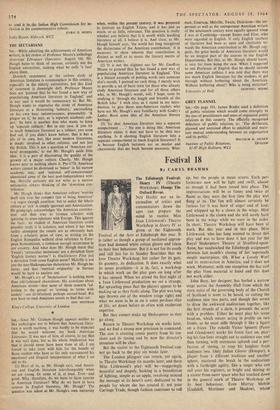SIR,—Since Mr. Graham Hough appears neither to like anthologies nor
to believe that American litera- ture is worth teaching, it was hardly to be expected that he would welcome my book American Literature. It was nice.of him, of course, to say that it was well done, but as his whole implication was that it should never have been done at all, I am forced to take issue with him for the benefit of those readers who have so far only encountered his emotional and illogical interpretation of what I set out to do.
(1) Most of us, as Mr. Hough says, read Ameri- can and English literature interchangeably when we are young. Or some of it, at least. True—and good. Why, therefore, do we have to have courses in American literature? Why do we have to have courses in English literature, Mr. Hough? The question was asked at Mr. Hough's own university when, within the present century, it was proposed to institute an English Tripos, and it has just as much, or as little, relevance. The question is really whether you believe that it is worth while teaching literature at all. I believe it is. And since, as Mr. Hough himself says, 'the world has long recognised the distinctness of the American contribution,' it is necessary to show wherein that contribution is distinct as well as to assess the literary merits of American writers.
(2) 'It is not the slightest use for Mr. Geoffrey Moore to pretend that he has found a new way of popularising American literature in England.' This is a blatant example of putting words into someone else's mouth. I pretend no such thing. I merely wish to provide a set of basic texts for those who already study American literature and for all those others who, in Mr. Hough's words, will, I hope, soon be studying it 'through the length and breadth of the British Isles.' I wish also, as I stated in my intro- duction, to give those non-American readers who have not Mr. Hough's easy familiarity with Godey's Ladies Book some idea of the American literary heritage.
(3) 'To shut American literature into a separate compartment . . .' No one is doing this. American literature exists; it does not have to be shut into anything. Is it shutting English literature into a separate compartment to teach English literature? It is because English lecturers are so insular and chauvinistic that my book became necessary. Whit-
man, Emerson, Melville, Twain, Dickinson—the im- portant as well as the unimportant American writers of the nineteenth century were equally ignored when I was at Cambridge—except James and Eliot, who were regarded as English. If only English teachers of literature had been as open and charitable to- wards the American contribution as Mr. Hough sug- gests, the great books of American literature would be an integral part of the courses in our English Departments. But this, as Mr. Hough should know, is very far from being the case. When I suggested to one Professor of English that he should include some American authors I was told that there was too much English literature for the students to get through without bothering about the American. Without bothering about? Who is being sectarian?


































 Previous page
Previous page